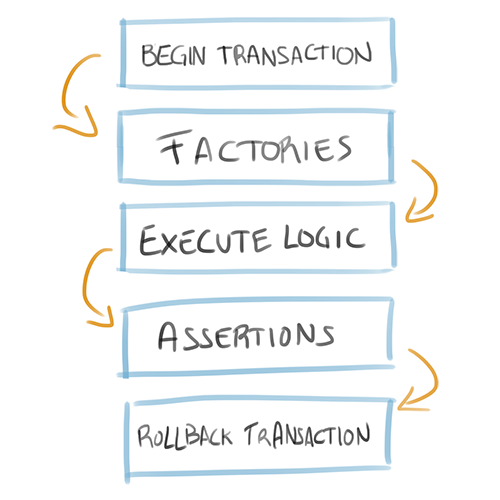
So you are interested in testing, aren’t you?
Not doing it yet? That’s the
right time to start then!
In this little example, I’m going to show a possible procedure to easily test your piece of code that interacts with a database.
Doing database integration tests, you will generally need few things for each test case:
- Setup test data in one or more tables (setup)
- Run the under-test functionality
- Check actual state on database is as expected (assertions)
- Clear all for the next test (teardown)
If not done carefully, most of these steps could bring more-than-wanted lines of code. Moreover, the resulting test runs are often quite slow.
The most difficult part is, in my experience,** setting up** and tearing down the database state to test the piece of code in question.
It’s simple, I’ll just insert data with a couple of raw “insert” queries and cleanup tables with “deletes”.
Done!
Do it, and you’ll most likely face walls of SQL code, hardly reusable, hard to
read and even harder to maintain. A very tedious and error prone method.
Moreover you can encounter performance issues, especially if more tables are
involved or if there are cascading deletes.

The best way to isolate your test case is an already present feature of SQL: transactions. Yes, they can help you.
Let’s suppose you are using the excellent pytest framework for your tests, a couple of well designed fixtures will do the work:
import pytest
from sqlalchemy.orm import sessionmaker
from sqlalchemy import create_engine
engine = create_engine('DB_CONNECTION_URL')
Session = sessionmaker()
@pytest.fixture(scope='module')
def connection():
connection = engine.connect()
yield connection
connection.close()
@pytest.fixture(scope='function')
def session(connection):
transaction = connection.begin()
session = Session(bind=connection)
yield session
session.close()
transaction.rollback()Woah! So easy?! Yes, it is.
In a few words:
connectionfixture makes sure there is only one database connection and that it’s closed after all test are run.sessionfixture makes sure each test runs in a separate transaction, and cleanup is guaranteed by the rollback. Rollback will be always faster that any custom delete query and will not forget to restore anything 😉
… Ok, but we haven’t entered any data yet! …
You’re right, let me introduce you to …
Factory Boy
Factory Boy is a tool for creating on demand pre-configured objects. It’s very handy and I personally suggest you to use it extensively.
Let’s say you have a User class with name and email. With Factory Boy you
can create a class bound with your User model.
import factory
class User:
def __init__(self, name, email):
self.name = name
self.email = email
class UserFactory(factory.Factory):
name = factory.Faker('name')
email = factory.Faker('email')
class Meta:
model = UserNow, just calling UserFactory.build() will generate a filled User
instance.
There are lots of features, such as properties overriding,
sequences and so on. Take a look at the
docs!
… Umm, nice! But what has this got to do with database? …
Well, what if I say you can actually bind factories with SQLAlchemy models?
class UserModel(Base):
__tablename__ = 'account'
id = Column(BigInteger, primary_key=True)
name = Column(String, nullable=False)
email = Column(String, nullable=False)
class UserFactory(factory.alchemy.SQLAlchemyModelFactory):
id = factory.Sequence(lambda n: '%s' % n)
name = factory.Faker('name')
email = factory.Faker('email')
class Meta:
model = UserModelThat’s all! Now creating and having a user on your database is simple as
writingUserFactory.create().
Mind. Blown.
Want more objects? UserFactory.create_batch(6)
*Mind. Blown. Again.*
If you think you didn’t get it, here is a full integration test in its splendor:
@pytest.fixture(scope='function')
def session(connection):
transaction = connection.begin()
session = Session(bind=connection)
UserFactory._meta.sqlalchemy_session = session # NB: This line added
yield session
session.close()
transaction.rollback()
def my_func_to_delete_user(session, user_id):
session.query(UserModel).filter(UserModel.id == user_id).delete()
def test_case(session):
user = UserFactory.create()
assert session.query(UserModel).one()
my_func_to_delete_user(session, user.id)
result = session.query(UserModel).one_or_none()
assert result is NoneAt line 5, you can see how SQLAlchemy session is bound to the factory class. Every action performed by the factory will use our session, whose lifecycle is handled by fixtures themselves.
Easy, few lines long, clean, understandable and … obviously it works! 😃
Such a smooth integration testing!

Of course this example is intentionally trivial, you can find slightly more real and organized examples in this repository I created on purpose.
Recap

In order to have a clean database integration testing, you should aim for:
- Running your test cases in isolated transactions, and rollback them.
- Describe your entities as models and delegate their creation to a factory system.
If there is not a factory library or system for your language, do it yourself and open source it!
Thanks for your time!
Let me know if you liked the article and what you think about it! 👋